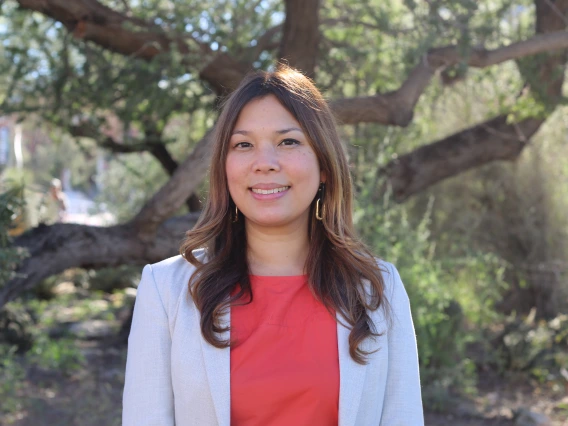
A project that weaves together Charles Dickens’ David Copperfield with a field study of historic Tucson locations has earned Dr. Jacqueline Barrios one of two Dorrance Dean’s Awards for Opening the Canon.
Barrios, Assistant Professor in the Department of Public and Applied Humanities, is awarded for her project, “Big Book Field Studio: Design Methods and the Canon.” The $20,000 award will fund the creation of a new general education course that will examine both a classic work of literature and the world in which students live.
The Dorrance Dean’s Award for Opening the Canon recognizes and supports faculty in the College of Humanities who are doing cutting edge curricular (re)design work that incorporates in novel ways texts that have been widely recognized as having enduring value and significance. The inaugural winners are Barrios and Dr. Anita Huizar-Hernández, Associate Professor in the Department of Spanish and Portuguese.
The core text for Barrios’ class will be Charles Dickens’ 1850 classic David Copperfield, but as students are guided through the reading, they’ll be adding additional context from work in a site-specific arts and design workshop. In the first 4-week module, students will read descriptions of the novel’s places: roadside haystacks, London pawnshops, childhood gardens, manufacturing plants and more. The second module will focus on urban history and fieldwork as students find analogs of the fictional 19th century London locations in their own surroundings.
Students will examine how the historic Tucson railroad depot, downtown streetscapes of “urban renewal,” or the indigenous memory preserve of Tumamoc Hill, for example, might relate to elements of the David Copperfield narrative.
“I’m interested in the affinity among things, the reader, the book and the city – and the ways in which the city of the book intersects with the city of the reader. For students, the city and the spaces of the novel can become a way to reimagine the place they’re living in,” Barrios says. “To make that kind of leap is part of what the humanities are asking us to do, to look for unforeseen connection and meeting points.”
One central question posed to students will be to consider how a modern Charles Dickens might build a narrative about David Copperfield in Tucson.
“How can I get students to use that strategy to immerse themselves in their own world and to discover more about their own place? How you build a sense of place is a big part of education. The more we can tie what we teach to students’ immersion in their world, the more they can make connections to the material. So we don’t always have to argue about relevance because the students are drawing from their own lives. The book becomes an equalizer and a community building object,” she says.
In the final module, students will create their own projects: multimedia installations, visual or 3D pieces, film, dance, or printed works, for a culminating exhibition. Aggregated, these projects “write” a new spatial biography of Tucson into being, bringing to consciousness a diverse variety of otherwise submerged, displaced or erased narratives of the city.
“Responding to the text doesn’t always look like a five-paragraph essay,” Barrios says. “I’m getting students to train their powers of observation and bring that kind of close reading we do with novels to spaces. What Dickens did was to walk the city and was himself a huge part of urban life. The novel is an outflow of that engagement with time and space.”
The project brings together Barrios’ research focus in 19th century urbanism and her longtime background as a public school teacher in Los Angeles.
“Teaching AP English literature to first-generation students, the canon is a very fraught barrier to students who otherwise would have lots to say about these big books,” Barrios says.
“Opening the canon feels like such a good fit with what I’m already doing, looking at the convergence of two spaces and creating cultural conversations between the book and the reader.”
The Dorrance Dean’s Award for Opening the Canon is a validation for Barrios about the potential such innovative projects have to reach students in new ways.
“The funding allows this work to not stay in the margins of humanities teaching. It supports collaboration and honors the expertise and time it takes to do these things,” she says. “This kind of knowledge is valuable and needs to be supported and needs institutions that believe in it.”
The Dorrance Dean’s Award for Opening the Canon is one component of the College of Humanities’ Fearless Inquiries Project, a long-term, flagship effort specifically aimed at catalyzing a national culture that prizes open discussion, independent judgement and the questioning of stubborn assumptions.
“On behalf of the entire College, I want to express our gratitude to Jacquelynn and Bennett Dorrance for supporting the Fearless Inquiries Project and enabling these crucial initiatives,” said Dorrance Dean Alain-Philippe Durand.
Barrios was selected for the award following an internal, competitive process, with a selection committee composed of alumni and other national leaders.
“Encouraging students to see the world of a classic novel come alive in their own daily lives is an exciting and innovative new way to teach a foundational text,” said Kim Jones, Vice Dean for Academic & Faculty Affairs. “The College is excited to enable Dr. Barrios as she introduces the humanities to students in new ways.”

